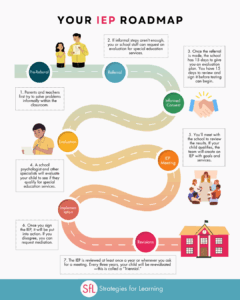No products in the cart.

Navigating the educational system to secure support for a child with dyscalculia can be daunting. Dyscalculia, a learning disability affecting math skills, requires specific strategies and a proactive approach for academic success. Here are essential tips and strategies to help you advocate effectively for your child.
Navigating the Assessment Process
As a parent, understanding your child’s learning needs is crucial for their academic success. A formal assessment can help set clear learning goals, accommodations, and services within an IEP or 504 plan, and guide the support provided by an Educational Therapist, Learning Specialist, or tutor. However, we know that obtaining a timely diagnosis can be difficult, especially with limited school resources or the high cost of private assessments. Consider exploring community or university clinics, which often provide more affordable options and may offer financial aid or sliding scale fees.
It’s also important to know that not every child requires a formal diagnostic assessment. A skilled Educational Therapist can use various tools to support your child’s learning. However, if you’re seeking specific accommodations or services through the school, a formal assessment may be necessary. We’re here to help—please contact us if you need guidance on assessment options and resources.
Preparing for IEP/504 Meetings
Building a strong, collaborative relationship with educators involved in your child’s care is key to ensuring your child receives consistent support. When preparing for your child’s IEP or 504 Plan meeting, stay head of the game by taking account these tips.
- Document Everything: Maintain detailed records of your child’s educational history and all communications with the school. Consider creating a digital archive of these documents, making them easier to search and share with those involved in your child’s care.
- Know Your Rights: It’s essential to familiarize yourself with the Individuals with Disabilities Education Act (IDEA) and Section 504 of the Rehabilitation Act. A Special Education Advocate can help you navigate these laws and provide support during IEP meetings. Resources like Wrightslaw offer valuable legal information and advocacy tips to help secure the special education services your child needs.
- Set Clear Goals: Work with the school to establish specific, measurable goals for your child’s IEP or 504 Plan. The IEP goals should not be vague; they should clearly outline when and how your child’s progress will be measured, using tools such as standardized tests, curriculum-based assessments, or screenings.
Check out our Frequently Answered Questions about the IEP or these Tips on Preparing for Your Child’s Annual IEP Meeting.
Addressing Social-Emotional Needs
Dyscalculia can affect a child’s self-esteem and create anxiety, which can further hinder learning. Providing the right emotional support is essential. Joining support groups for both parents and children can offer practical advice and a space to share experiences. A qualified Educational Therapist can also address the social-emotional challenges associated with dyscalculia. They use various educational and cognitive strategies to help children develop effective learning techniques, overcome obstacles, and build confidence in their academic abilities. Lean more about Educational Therapy and how it supports dyscalculia.
Navigating the educational system to support a child with dyscalculia requires a proactive and informed approach. By understanding the assessment process, preparing thoroughly for IEP or 504 meetings, and addressing both academic and emotional needs, you can advocate effectively for your child.







No comment yet, add your voice below!